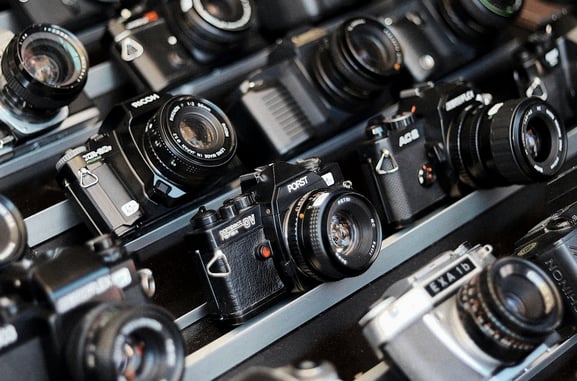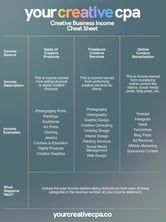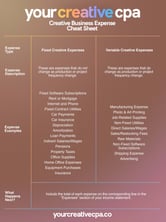
Latest Article: What is a Sovereign Wealth Fund and Why is America Creating One?
The Best Tax Deductions For Your Creative Business
Learn the top tax write-offs for creative businesses, like cameras, music equipment, art supplies, travel, and more. Learn to track expenses & keep more money.
TAXTAX 101
David Kindness, CPA
5/7/2024



The Best Tax Deductions For Your Creative Business
Updated on May 2, 2024
Written by David Kindness, CPA
Why you can trust Your Creative CPA
Our content is written, edited, or both by industry experts who are creative entrepreneurs just like you. Learn more.
Many creative businesses don't take full advantage of all the tax deductions they can, and being a creative business owner is stressful enough without worrying about confusing tax laws, accounting concepts, and financial laws.
This guide will explain the best tax write-offs for creative businesses, and by the end of it, you'll know which expenses to include on your income statement right now, so you can minimize your tax bill starting today.
Fast Facts About Tax Deductions for Creative Businesses
Tax deductions help lower your tax bill by reducing your taxable income.
There are many deductible expenses specific to creative businesses.
Keeping good records is key to maximizing your deductions.
A tax professional, like a CPA or EA, can offer personalized advice.
What Are Tax Deductions?
Tax deductions are business expenses that you can subtract from your taxable income, lowering your overall tax bill. The Internal Revenue Service (IRS) allows you to deduct certain business expenses if they are ordinary and necessary for running your business. In other words, if the expense is common in your field and is related to running your business, it's likely deductible.
Deductible expenses are one of the most important tools for lowering your tax bill throughout the year.
Best Tax Deductions for Creative Businesses
Now that we understand what tax deductions are and how they can lower your tax bill, let's explore the most common tax deductions for creative businesses. Expense categories include things like equipment and supplies, travel expenses, subscriptions, marketing and advertising expenses, inventory and materials, home office, and more.
Creative Equipment and Supplies Expense
Equipment and supplies you purchase for your creative business are tax-deductible and should be included as an expense on your income statement and as a deduction on your tax return. These types of expenses can include:
Cameras, lenses, tripods, filters, flashes, lights, SD cards, etc.
Musical instruments, speakers, mics, etc.
Art supplies like easels, paint, brushes, canvases, etc.
Computers, monitors, hard drives, cables, SD cards, etc.
Office equipment such as printers, scanners, ink, and photo or art paper
Travel Expenses
Expenses you incur for business travel are tax deductible! That means that if you have a photo or video shoot planned in some beautiful faraway location, your expenses to get there, stay there, and come back can be included on your tax return. Business travel expenses can include....
Flights to and from the travel location
Lodging, like hotels, Airbnb, VRBO, or hostels while you're there
Ground transportation, like shuttles, busses, Uber or Lyft rides, taxis, or car or bike rentals
Travel fees, like baggage fees, airport or hotel fees, and fees to enter shoot locations
Conference registration fees (if traveling for a business-related conference
Marketing and Advertising Expenses
Money to spend to spread the word about your business is tax deductible, so run those ads on Instagram, Tiktok, Youtube, Google, etc. as much as your heart desires.
Social media ads: Instagram, Facebook, Tiktok, Youtube, Twitch, Kick, Pinterest, etc.
Google, Bing, and other search ads
Giveaways on social media or your website
Affiliate and influencer campaigns
Traditional print advertising: fliers, business cards, big billboards, point of purchase materials, etc.
Banner ads on websites
Podcast, radio, or TV ads
Home Office Expenses
Home office expenses - also referred to as "business use of home" - are tax deductible on your tax return, and should be included in the expense section on your income statement. Home office expenses are calculated as the percentage of your home's total square footage that you use exclusively for business. This could be the room you use as an office, a corner of your living area, etc. The following expenses are included in this calculation:
The percentage of your rent or mortgage payment that relates to your home office
A percentage of your home insurance, renters insurance, property taxes, etc.
A percentage of your utilities expense
A percentage of your internet expense
For example, if your house's total square footage is 1,000 sq ft, and you use 100 square feet as your home office, then the deductible portion of each of the above expenses would be 100 / 1,000 = 10%.
Subscriptions Expenses
As a creative business owner, you probably have a bunch of subscriptions - editing software, storage backups, music, shows, accounting software, etc. These subscriptions might get pretty expensive, and the good news is that they are tax deductible!
Software subscriptions for photo and video editing, graphic and web design, music creation, podcasting, audio remastering, etc.
Data backup subscriptions like cloud services and data recovery services
Music subscriptions like Spotify, Apple Music, Soundcloud, or podcast services may be partially or fully deductible
Audiobook subscriptions may be partially or fully deductible
Video or TV subscriptions may be partially or fully deductible
Salaries and Wages Expense
If you hire people to help run your business, the cost of paying them is tax-deductible.
The annual, hourly, or project-based fees you pay to employees or freelancers
Any benefits, retirement contributions, etc you pay to employees or freelancers
Office Supplies Expense
Office supplies are all the little things you need to run your business day-to-day, like pens, pencils, paper, notepads, etc. These contribute directly to running your business, so the IRS allows you to deduct them on your tax return.
Pens, pencils, paper, notepads, sticky notes, binders, folders, paperclips, clips, etc.
Printers, printer paper, and printer ink
letters, envelopes, stamps/postage, etc.
Cleaning products like desk wipes/sprays, rags, computer wipes, microfiber cloths, etc.
Vehicle Expenses
If you use your vehicle for business purposes, then the costs incurred in purchasing, running, maintaining, and repairing your vehicle may be partially or fully deductible on your tax return.
The cost of your vehicle purchased for business use
The cost of gas, oil, windshield wiper fluid, coolant, etc.
The cost of repairs and maintenance to keep it running smoothly
Note that you'll need to multiply each of these expenses by the percentage that you use the vehicle for business purposes. For example, if you use the vehicle 100% for business purposes, then the expenses related to it are 100% tax-deductible. If you use the vehicle 20% for business and 80% for personal purposes, then the expenses are only 20% tax-deductible.
Also note that the IRS allows one of two deductions: either the "simplified method", which is a set dollar rate per mile you drive each year, or the "actual expenses method", which lets you deduct the actual amount you spend on the vehicle each year.
Meals and Entertainment Expenses
Meals and entertainment expenses incurred for your business are generally tax-deductible, but the rules can be a bit complex...
As a general rule, meals and entertainment expenses are only 50% deductible for tax purposes. However, there are a few situations where you can deduct 100% of the cost:
Employee meals that are provided on-site (in the office) for the convenience of the employer. For example, if you provide free lunch to your employees who have to work through their lunch break.
Small business meals: If your business has an average annual gross receipt of $25 million or less (adjusted annually for inflation), you can deduct 100% of business meal expenses in 2024 (this provision was previously in effect for 2021 and 2022 and may be subject to change).
Other Expenses
"Other" expenses might sound like a broad category, and it can be, but it basically includes any expenses you incur to run your business that aren't included in any of the other categories. Some of these expenses may have their own categories on your income statement or tax return. Common miscellaneous expenses include...
Bank fees, foreign conversion fees, foreign currency charges, merchant fees, credit card fees, etc.
Professional services: accountants, lawyers, graphic designers, web designers, software developers, etc.
Professional permits, licenses, and certifications
Continuing professional education, like required CPE courses, online courses, books, or even formal education.
Any other expenses related to your business that don't fit into one of the above categories.
Depreciation Expense: this is a portion of the cost of a building/house, a vehicle, or a piece of equipment that is above a certain dollar threshold. To calculate depreciation expense, you'd take the total cost of the asset and divide it by its useful life in years. Accumulated Depreciation, which is the total depreciation expense so far, will be included on your Balance Sheet.
Amortization Expense: this is a portion of the cost of an intangible asset, like a patent, a copyright, or a trademark. To calculate amortization expense, you'd take the total cost of the intangible asset and divide it by its useful life in years. Accumulated Amortization, which is the total amortization expense so far, will be included on your Balance Sheet.
Now that we understand what tax deductions are, let's take a look at the best ways to track deductions and tax write-offs.
How to Keep Track of Tax Deductions
Staying organized is key, and the better you are at keeping accurate records of expenses, the more you'll save and the easier tax season will be. There are many strategies to track tax deductions, including spreadsheets, accounting software, expense tracking apps, and more.
Here are Your Creative CPA's favorite ways to keep track of tax deductions:
Business Credit Card: Opening one or more business credit cards can help you track business expenses and maintain expense records.
Business Bank Accounts: Opening a separate bank account for your business can help you track income and expenses easily.
Save Receipts: Gather receipts for everything you buy for your business and save them in separate physical envelopes or digital folders. Categorize them logically to make finding expenses down the road easier: travel expenses, office expenses, equipment, auto expenses, travel expenses, etc.
Digital Receipts: There are a number of scanner apps that let you easily create digital copies of receipts when you're on the go.
Track Your Mileage: If you're wondering how to track mileage for taxes, consider utilizing a mileage tracking app on your phone, spreadsheet software like Excel or Google Sheets, or accounting software like Quickbooks. You can also simply take a note of the starting and ending mileage for each of your work trips.
Conclusion
You deserve to maximize your deductions and save as much on taxes as possible, and so does your business. Tax deductions might seem complicated and intimidating, but the information in this article will allow you to start optimizing your tax deductions starting right now.
By understanding the best tax deductions and maintaining good records, you can keep more money in your pocket and focus on what you do best: unleashing your creativity and building your dream business.
Frequently Asked Questions (FAQs)
What if I haven't kept my receipts for a while?
Don't worry - the IRS allows you to reconstruct your expenses if receipts are lost or haven't been collected. Keeping records of expenses in spreadsheets (like Excel or Google Sheets), notes, and bank statements can be helpful proof and can make reconstructing expenses easier.
Can I deduct a computer used for both business and personal use?
Yes, you can deduct a portion of the cost based on the percentage of business use vs. personal use. Computers, hard drives, monitors, etc, are common expenses for most creative businesses.
Should I hire an accountant for my online business?
For many creatives with simple finances, basic bookkeeping and tax preparation software might be sufficient. However, if your business grows complex, you might consider hiring an accountant for tax advice and filing or for help with tasks like bookkeeping and payroll.
How do I know if an expense is deductible?
Fear not - we've got you covered. Articles like the one you just read will help you understand what expenses are deductible and why, and you can always reference our Creative Expense Cheat Sheet to help you understand. If you're still unsure, consider consulting with a tax professional to explore your options.
How do you track mileage for taxes?
Mileage can be a tricky expense to track - do you track it all the time? Just some of the time? Only when you're driving for work? The answer is that, in general, only miles driven for work are tax-deductible. This includes driving to and from client meetings, the camera or art store, the studio, photo or video shoots, art installations, music venues, and other such locations.
We recommend using your phone's notepad and a spreadsheet software like Excel or Google sheets. You can also use an accounting software like Quickbooks to help track mileage over time.
Disclaimer: the information provided in this article is for educational purposes only and does not constitute tax, accounting, investing, legal, or financial advice. The information in this article does not take into account your unique financial or business situation or goals, and YCCPA cannot be responsible for reader's financial decision-making. YCCPA's goal is to educate and support you on your creative business journey.
Written by David Kindness, CPA
David is a CPA (Certified Public Accountant) and professional photographer, videographer, and designer based in San Diego, California. Learn more.




supported by ads
Your Creative CPA is supported by the ads you see in our articles and guides.
These ads help us help creatives like you.
READ NEXT
What is an Income Statement? A Creative Entrepreneur's Guide
2024 Guide to Deducting Expenses For Your Creative Business
What Counts as Income in a Creative Business? A Guide for Online Creators

financial wisdom for creatives, by creatives
Created by David Kindness
Copyright 2025 Terms












